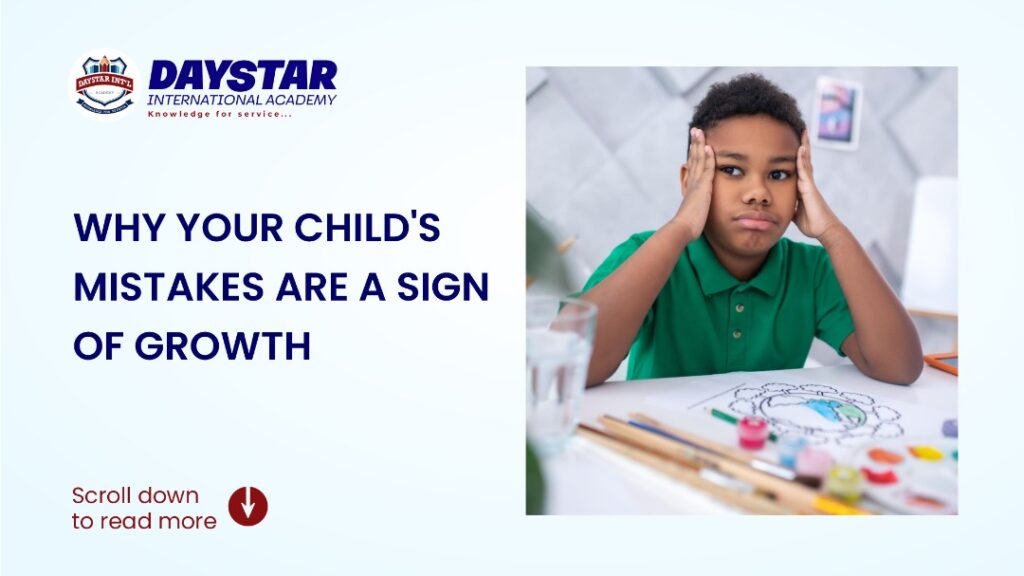
Every parent dream of seeing their child succeed by acing
tests, excelling in activities, and shining brightly in everything they do. But
here’s the truth we often forget, success doesn’t happen without mistakes.
In fact, mistakes are not setbacks, they are stepping stones.
When children make mistakes, it’s not a sign of weakness or
failure. It’s evidence that they are trying, experimenting, and pushing their
limits. Just like a toddler stumbling before learning to walk, mistakes are an
essential part of the journey to mastery.
Why Mistakes Matter in Learning
Research on child development and psychology shows that when
kids are allowed to make errors and reflect on them, they develop stronger
problem-solving skills and deeper understanding. This is the foundation of what
experts call a growth mindset, the belief that abilities and
intelligence can be developed with effort, strategy, and persistence.
Imagine your child attempting a math problem and getting it
wrong. Instead of viewing that as a failure, it can be reframed:
- “You
tried a strategy that didn’t work. Now let’s figure out another one.”
- “What
can you do differently next time?”
This reframing shifts the focus from the end result to the
process—helping your child see mistakes as learning opportunities rather
than dead ends.
How Parents Can Nurture Growth Through Mistakes
1. Normalize Mistakes
Let your child hear you talk about your own mistakes and how
you learned from them. For example, “I once forgot to double-check an email at
work and it caused confusion. Now, I always proofread before sending.” This
shows them that even adults slip up—and grow from it.
2. Praise Effort, Not Just Results
When children receive praise only for “being smart” or
“getting it right,” they may become afraid to try challenging tasks. Instead,
acknowledge their effort:
- “I can
see how hard you worked on this.”
- “You
kept trying even when it was tough, that’s impressive.”
This builds resilience and encourages them to embrace
challenges without fear of failure.
3. Help Them Reflect, Not Dwell
After a mistake, ask gentle questions:
- “What
do you think went wrong?”
- “What
might you try differently next time?”
This turns reflection into a problem-solving exercise instead of a punishment.
For example, if a child stumbles over reading aloud, you
might say, “That word was tricky, wasn’t it? Let’s break it into smaller parts
and try again.” This shifts the moment from embarrassment to empowerment.
4. Encourage Risk-Taking in Safe Spaces
Children learn best when they feel safe to take risks
without harsh judgment. Whether it’s trying a new art technique, speaking up in
class, or joining a sports team, remind them: “It’s okay if you don’t get it
perfect. What matters is that you tried something new.”
5. Reframe Failure as Feedback
Instead of labeling something as “wrong,” help your child
see it as feedback. For instance, if their science experiment didn’t
work, say, “That result tells us something. What can we change to make it
better?”
This approach empowers them to see mistakes as guides rather
than roadblocks.
Why This Mindset Matters Beyond Childhood
Children who learn to embrace mistakes often grow into
adults who are more adaptable, resilient, and confident. In school, they’ll be
less afraid of difficult subjects. In life, they’ll be better problem-solvers
and more persistent in the face of setbacks.
Final Thought for Parents
The next time your child makes a mistake, whether it’s
spilling juice, mispronouncing a word, or struggling with homework, pause
before rushing to correct or criticize. Instead, take a deep breath and
remember: this is growth in action.
Every stumble is a step forward. Every mistake is a lesson.
And every lesson brings your child closer to becoming a stronger, wiser, and
more resilient learner.
✅ Takeaway for Parents:
Mistakes aren’t signs of failure, they’re proof that your child is learning,
growing, and building the mindset they’ll need for life.

